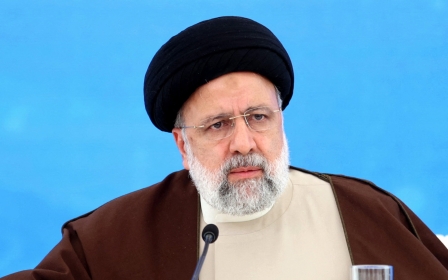Could Raisi's death be a turning point for Iran?

Until the 2020 parliamentary elections in Iran, despite the stringent oversight of the ultra-conservative Guardian Council, which vets candidates in all Iranian elections, moderate and reformist factions experienced fluctuating levels of representation in parliament.
But in 2020, all primary-tier, and even secondary-tier, candidates affiliated with these factions were disqualified. Consequently, a significant portion of the electorate, which had previously engaged in elections in the hopes of achieving change through the ballot box, abstained from voting.
With only 42.6 percent voter turnout, this election marked the lowest participation rate since the 1979 inception of the Islamic Republic, resulting in an uncontested conservative majority in parliament.
Supreme Leader Ayatollah Ali Khamenei appeared gratified by this outcome, commending the “substantial participation of the people in the elections despite the prejudiced propaganda”.
Websites affiliated with or supporting extremist factions, which published daily critiques of former President Hassan Rouhani’s moderate government, attributed the failure of the nuclear agreement, from which the Trump administration withdrew in 2018, to the government’s conciliatory stance towards the US. These media outlets implied that a plan to “unify the government” was underway.
Stay informed with MEE's newsletters
Sign up to get the latest alerts, insights and analysis, starting with Turkey Unpacked
From 1989, when Khamenei ascended to the leadership, until 2021, when Ebrahim Raisi won the presidential election, no president had been fully aligned with Khamenei. As part of the unification strategy, all major moderate and reformist candidates were disqualified by the Guardian Council in 2021, leading to Raisi’s victory. He was the favoured candidate of the deep state.
This vote also recorded the lowest turnout in presidential elections since the establishment of the Islamic Republic.
Precipitous decline
This trend continued in the first round of parliamentary elections this past March, where voter participation was around 40 percent. This is particularly striking given that years earlier, Khamenei had described a 40 percent electoral participation rate in some countries as a “disgrace”. In Tehran, the epicentre of Iran’s political developments, participation dropped to 24 percent.
The situation deteriorated further in the second round this month, with participation in Tehran plummeting to seven percent of eligible voters. The top candidate in Tehran secured a parliamentary seat with just 3.5 percent of the eligible vote.
Is this precipitous decline in electoral participation important for the deep state? Prior to the March elections, Khamenei remarked: “The enemy is looking for an unprosperous election … It is paramount that the elections be prosperous and full of excitement.”
By holding elections, the deep state seeks to project governmental legitimacy on the international stage. The dramatic reduction in participation subverts this objective
By holding elections, the deep state seeks to project governmental legitimacy on the international stage. The dramatic reduction in participation subverts this objective.
Another pressing issue is that in such a context, where the populace has lost faith in the electoral process, the likelihood of protests escalates daily. The atmosphere of discontent is poised for a potential eruption.
The unprecedented decision by Mohammad Khatami - the former president of Iran and spiritual father of the reformist movement, who has consistently advocated that reforms are attainable through the ballot box - to abstain from voting in this election cycle caused considerable surprise.
On the other hand, a point of significance for the Iranian deep state is that whenever protests arise in Iran, western countries, particularly the US, escalate their pressure on the Iranian government by intensifying sanctions. This pattern persisted after the 2009 protests and the emergence of the Green Movement, through to the 2022 protests known as the Mahsa Movement.
Failed strategy
Against this backdrop, it is crucial to consider which of the following two scenarios will occur in the upcoming presidential elections.
On Wednesday, the candidates for presidential elections will start registering and it will last five days. The final list of candidates is due to be announced on 11 June and the vote is scheduled to be held on 28 June.
A caveat before delving into possible scenarios: the strategy of a unified government has failed. The conflict between different factions within the conservative movement (which I delineate into two factions, revolutionary and super-revolutionary) intensified before the recent parliamentary elections, as they mercilessly fought for dominance. Tensions reached such heights that both sides orchestrated scandals against each other and exposed corruption cases.
Given this situation, the fundamental question posed to the central core of power (comprising Khamenei and the military-security apparatus of the Revolutionary Guards) is whether, considering the sharp decline in voter participation combined with increasing scrutiny of the system’s legitimacy at the international level, it is prudent to persist with the trend of wholesale disqualification of moderates.
This is the first scenario: given the gravity of the repercussions stemming from the decline in electoral participation, the deep state may make adjustments and abandon the policy of wholesale disqualification. But this does not imply an immediate opening of doors to all moderate and reformist candidates. Any qualified candidate in this possible new framework would need to have Khamenei’s trust.
Ali Larijani could potentially fill this role. Considered a moderate conservative, Larijani has never officially been associated with the moderate or reformist streams, although his political inclination leans towards moderation.
Having served as parliament speaker for 12 years (from 2008 to 2020), Larijani faced disqualification by the Guardian Council in the 2021 presidential election, which was notably orchestrated to elevate Raisi to the presidency, presumably providing a springboard for his ascension as the future leader.
After Larijani’s disqualification, Khamenei delivered a speech that experts interpreted as referring to him, stating: “Some of those who were disqualified were treated unjustly.” Larijani’s primary advantage lies in his position as an adviser to Khamenei, positioning him in close proximity to the leader of Iran.
Intra-group competition
In addition to Larijani, other potential candidates from the reformist and moderate factions who could emerge in the upcoming elections if the system opts for adjustments, include MP Masoud Pezeshkian, former Communications Minister Mohammad Javad Jahormi, former parliamentarian Majid Ansari, and former central bank head Abdul Nasser Hemmati.
But several questions beg to be answered. Will Larijani or any of the other aforementioned individuals choose to run in the elections? If they do, would they receive the Guardian Council’s approval? Most importantly, if such a scenario were to unfold, would the people return to the polls, or has a significant portion of society lost hope and turned away from elections indefinitely?
In the second scenario, if the deep state opts to continue the trend of unification, the competition would be intra-group within the conservative camp.
One of the following individuals could then emerge as the next president of Iran: Mohammad Mokhber, who is currently filling the role on an interim basis; Speaker Mohammad Bagher Ghalibaf; Parviz Fattah, head of the Executive Headquarters of the Imam’s Directive; hardliner Saeed Jalili, a member of Iran’s Strategic Council on Foreign Relations; or Mehrdad Bazarpash, a staunch, self-proclaimed revolutionary and current minister of urban development.
For around 15 years, Mokhber, who has been acting president since Raisi’s death, oversaw the Executive Headquarters of the Imam’s Directive, a financial empire solely accountable to Khamenei. He thus enjoys Khamenei’s confidence.
Ghalibaf, meanwhile, received 450,000 votes in the most recent parliamentary elections, compared with 1.2 million votes in 2020. He is entangled in numerous corruption allegations exposed by his rivals within the conservative camp. There have been unverified reports that he decided to resign from the new parliament that convenes on 27 May, but after meeting with a high-ranking official (a term often used to refer to Khamenei), he was assured that he could retain his leadership position in the new parliament.
The names of qualified candidates are expected to be announced by the Guardian Council on 11 June. Should the second scenario unfold, we can anticipate an intense intra-group conflict between the revolutionaries and super-revolutionaries, marked by relentless revelations.
A Potential Game Changer
However, one event can upset the above equations: the candidacy of Alireza Arafi. Alireza Arafi is the head of all seminaries in Iran and the deputy to the head of the 88-member assembly of experts of the leadership which is tasked with appointing the supreme leader in the event of the incumbent's death.
I argued in an article published earlier this month that he, alongside Raisi, is one of the two prime candidates to succeed Khamenei.
On 24 May, it was reported that some religious organisations urged him to run in the elections. Arafi dismissed the request with a single word: "no".
Nonetheless, there remains a possibility that he might reconsider. Should this occur, there is a substantial likelihood that conservative candidates would withdraw in his favour, and moderate candidates would be disqualified by the Guardian Council, mirroring the events of 2021 that culminated in Raisi's victory.
The views expressed in this article belong to the author and do not necessarily reflect the editorial policy of Middle East Eye.
Middle East Eye delivers independent and unrivalled coverage and analysis of the Middle East, North Africa and beyond. To learn more about republishing this content and the associated fees, please fill out this form. More about MEE can be found here.







